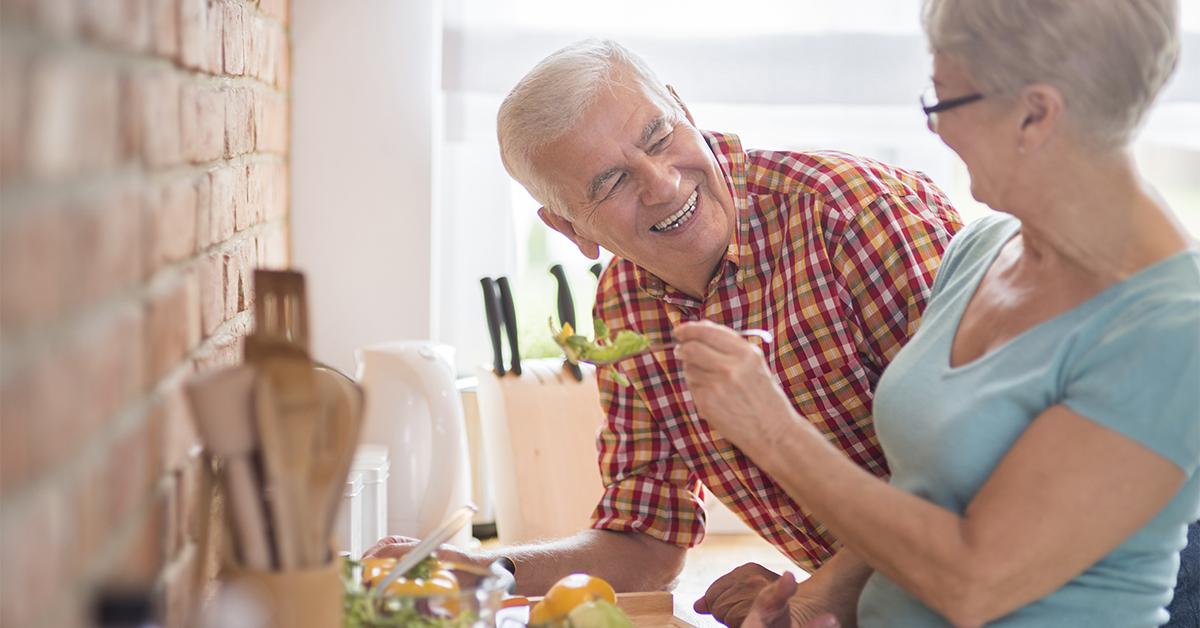Eat Smart! How Proper Nutrition Can Help You Stay Healthy and Active as a Senior
Written by Stannah
Eating well with balanced nutrition is essential for people of all ages. However, as our body ages, it becomes even more vital that we maintain a proper diet. Consuming a well-planned and balanced mix of foods may help reduce the risk of heart disease, stroke, Type-2 diabetes, bone loss, some forms of cancer and anemia.

If you are already afflicted by these conditions, a nutritional diet can help manage these symptoms and provide you with vital nutrients for your muscles, bones and organs.
South Australian Health has created a step-by-step guide to get you, or your elderly loved ones, on the path towards a healthier lifestyle.
Understand what a Healthy Plate is
A common topic when discussing health and dieting is the 2 and 5 – 2 fruit and 5 veg, as witnessed by the ongoing Go for 2 & 5 campaign and the Australian Dietary Guidelines.
The guidelines are a great read for those who are not sure what they should be eating for optimum health. The guidelines are even more important to follow in later years as our bodies may not be as resilient as they once were.
Vary your Food to Obtain Important Nutrients
As we age, it’s important that we consume a variety of foods to ensure we get all the necessary nutrients to keep our bodies strong and healthy. It is especially important that elderly people choose foods that are high in fiber, calcium, and Vitamin D, and limit salt (sodium) as much as possible.
A healthy meal should include:
- Lean protein (Lean meats, poultry, seafood, eggs, nuts, legumes)
- Fruits and vegetables (bright colors – deep greens, orange, red, purple)
- Whole grains (brown rice, whole wheat pasta, oats, quinoa, barley)
- Low-fat dairy (milk, cheese, yoghurt)
Don’t Dismiss the Nutrition Facts Label
The healthiest options are generally found on the perimeter of the grocery store in the produce, meat and dairy sections. These are the fresh, whole foods. However, if you do eat packaged foods, make sure to carefully read the nutrition label.
As a senior, it is important to find items low in fat, sugar and sodium. Items such as cakes, soft drink, chocolate, chips, etc. do not fall within the items required for a healthy meal (or snack), and so should be avoided except for very special occasions.
Choose foods that are easy to prepare
For older people with mobility issues or that live alone, it can be easy to fall into the trap of eating unhealthily because preparing food can be difficult. This is why you should choose easy to prepare meals with foods with a long shelf life. Choose items like tinned and frozen fruit and veggies, baked beans, spaghetti, canned fish, sauces, canned salt reduced soups, and readymade meals that are nutritionally balanced.
Stay Hydrated
Water is one of the most vital nutrients for bodies of all ages, however, it is unfortunately often neglected.
Dehydration can lead to a litany of complications that can be further amplified for senior citizens. Drink small amounts of fluids consistently throughout the day. While water remains the best option, tea (without sugar) can help too. Avoid drinks high in sugar and sodium, unless recommended by a doctor, as these may further dehydrate you.
Remember to Eat Regularly
It can be easy to skip meals, especially when you are on your own. To keep up a healthy, regular eating routine, try to have your meals at the same time each day.
Choose the foods we’ve listed as easy to prepare so that you don’t have to be overwhelmed by doing cooking. You can try eating smaller, more frequent meals if you are finding yourself very full after each meal.
For those who are active but still have difficulty traversing the stairs in their home, a Stannah Stairlift serves as a perfect complimentary option to a new nutrition plan.
With more than 150 years of experience, Stannah is one of the most respected names in the industry and a Stannah Stairlift will ensure you, or your elderly loved ones, are able to navigate your home safely and independently.
